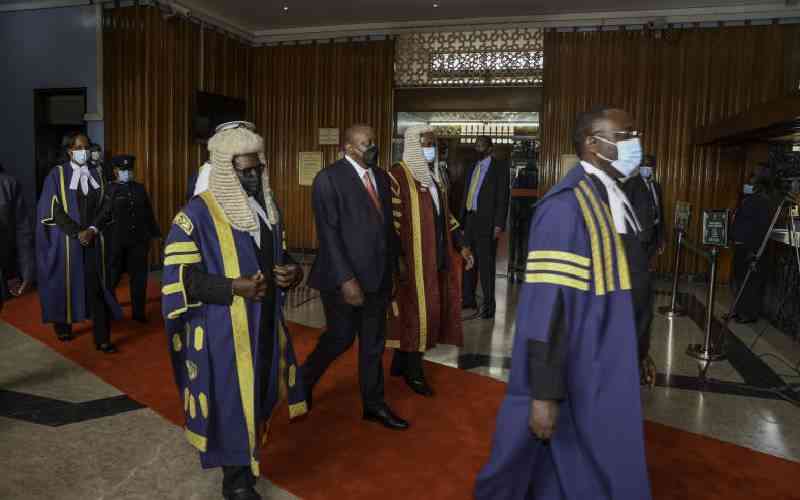
Senators and Members of the National Assembly have two months to resolve a long-running dispute on the roles of the two houses of Parliament in legislation.
The Supreme Court on Tuesday gave Senate Speaker Amason Kingi and his counterpart Moses Wetang’ula until September 17, 2023, to submit a written statement.
The statement should indicate that a consultative forum they have formed has brokered a deal on how the two houses will be seeking concurrence when passing laws.
Chief Justice Martha Koome, her deputy Philomena Mwilu and Justices Mohamed Ibrahim, Smokin Wanjala, Njoki Ndung’u, Isaac Lenaola, and William Ouko unanimously agreed to give the lawmakers a last chance even as sibling rivalry openly played out before them.
Senate’s lawyer Okong’o Omogeni accused National Assembly of delay tactics.
He said that the lower house had gone ahead to pass the Finance Act, 2023, and the Water Act without seeking a consensus from the upper house.
According to the senior lawyer, Kingi wrote to Wetang’ula, giving him a 21 days ultimatum to have the issues raised settled.
Wetang’ula, the court heard, wrote back to Kingi asking for 60 days.
Omogeni asked Kenya’s top court to stick to the 21 days. He argued that if they do not break the ice, then it was upon the court to settle the dispute.
“We have had some discussions and two technical teams but I want to be very candid that we are still experiencing the same problem. We have two cases where the High Court has issued injunctions because the National Assembly not seeking concurrence. The first one is the water regulations and the Finance Act because of the passage of that bill because of failing reference to two houses.
We had a discussion yesterday and we agreed that the court can hear us after 21 days and in the event we are not able to agree, we proceed to a hearing. It has been a tough long-drawn battle. If parties cannot agree on the interpretation of the constitution,” said Omogeni.
On the other hand, National Assembly’s lawyer Issa Mansur told the court that his client was seeking 60 days.
He stated that the time would allow the two houses to agree on something.
In a rejoinder, Omogeni stated that the discussions were to start in February this year. However, he said, National Assembly has been dragging its feet.
“I want to invite the Supreme Court to take notice of the fact that this petition was filed in December 2021. It has been pending in the Supreme Court all this time. It is true that the Speaker of the National Assembly wrote to Senate Speaker requesting 60 days but because these negotiations started on February 2023 and in many occasions, the National Assembly has been postponing the meetings, the Speaker of the Senate requesting 21 days,” said Omogeni.
At the heart of the battle between the Senate and the National Assembly is the validity of 23 laws, which Senators accuse Members of the National Assembly of passing without concurrence.
Initially, High Court in Nairobi annulled Appropriation Act 2019, the Finance Act, on account that it gives the national government exclusive authority to implement housing needs when it should be a preserve of the county governments.
The Kenya Coast Guard and Service Act which established an administration to manage the coastal region was also revoked and Tax Laws passed by MPs to enhance tax on homeownership and provide incentives to first-time homeowners.
Other laws the judges struck out are the Public Trustees Act which sought to reduce the time taken to administer the estate of a deceased person, the Building Surveyors Act which is used to register surveyors, and the Computer Misuse and Cybercrime Act intended to fight terrorism activities.
The Statute Law (Miscellaneous Amendment) Act contained several changes to the management of government agencies, Equalization Fund Act, Health Act, Sacco Societies Act, Capital Markets Act, Sports Act, National Integration Act, and the National Youth Service Act were also struck out.
Media practitioners and social media users were also a beneficiary of the invalidated laws after the judges declared the Computer Misuse and Cyber Crime Act which criminalizes libel as unconstitutional.
As punishment for the National Assembly’s insistence in by-passing the Senate in passing bills, the judges declared Section 121 of the house’s standing orders as unconstitutional.
Justices Jairus Ngaah, Anthony Ndungu and Teresia Matheka declared that the National Assembly has no monopoly to unilaterally pass laws without seeking the concurrence of their counterparts in the Senate.
Aggrieved, the then National Assembly speaker Justin Muturi (current Attorney General) moved to the Appeals Court, arguing that High Court erred by failing to consider the roles of the two houses of Parliament.
The Court of Appeal reversed the High Court orders and sent the case back to the High Court.
Yesterday, Senators asked the Supreme Court to expedite the hearing as they are aggrieved by the orders to return to the High Court. They stated that the High Court has set October 2 as the date to hear the case.